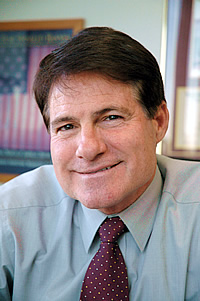18 Million Cracks?
Women Still Have a Long Way to Go
October 21, 2008
By Tony Fellow

Tony Fellow
This presidential election may have proven one thing: a mother still can’t look her daughter in the eye and say, “You too could be president of the United States.”
England, as well as India, Pakistan and Israel, have had female prime ministers. So have Portugal, Norway, Argentina, Bangladesh, Turkey, Canada, New Zealand and South Korea. More than 42 countries have seen women as chiefs of state since Evheniya Bohdanivna Bosch became acting president of the Ukraine in 1918. At least 10 women led countries before the 20th century. And many of them, such as Margaret Thatcher, Indira Gandhi and Golda Meir, have taken their places among the world’s greatest leaders.
The United States is a different story.
Hillary Clinton may have splintered the glass ceiling with 18 million cracks, perhaps gathering more votes than any female in world history, but it looks almost impossible for women to break through that ceiling.
According to former Newsweek reporter and Daily Titan adviser Ricardo Chavira, "The media are pushing the story line that we’ve crossed into a post-racist period. It's a great story, but it very well might not be true.”
Though race has taken a back seat, sexism has not. And Hillary Clinton is certainly not the first woman to deal with it. However, she is the first serious female presidential candidate in the nation’s history to have to.
Abigail Adams, the nation’s second first lady, certainly had what it took to run for president. Even Thomas Jefferson said she was the only woman who could go toe to toe with the men when it came to political discourse. But for Abigail, it was unthinkable. Women were property in Colonial America. She couldn’t even vote.
A lot has changed in modern America. Sexism hasn’t. Hillary Clinton, considered the nation’s most powerful woman, might as well be baking cookies with Abigail. Women have come a long way, but not long enough as far as the political arena is considered.
“Sexism is surely a more germane issue than racism in the present campaign,” says Laura Triplett, Cal State Fullerton professor of communications. “Racism is a socially undesirable prejudice to maintain; espousing or endorsing such prejudice has a negative impact on the individual doing so. Sexism is a normalized injustice in this country. It is so embedded into the cultural fabric; we rarely recognize it as anything out of the ordinary.”
She says anyone can make a sexist remark with little fear of negative social reaction.
“We are a society that laughs at sexist jokes, reveres ditzy women (e.g. Jessica Simpson), are entertained by female stupidity (e.g. Britney Spears), idolizes whorish behavior (e.g., the mega successful Girls Gone Wild video series), and encourages body dissatisfaction (e.g. Bravo’s "Make Me a Supermodel" during which an already overly-thin female contestant was openly chastised for having “thick, jiggly legs that shouldn’t be on any runway”)."
It is not just men who gave Clinton a bad time.
Triplett says women, to an even greater degree than men, act as a more significant impediment to the success of women.
“The United States is a patriarchal society,” she says. “Our history as well as our current social climate is based on male domination; women who challenge that are viewed as a threat to the status quo.”
Triplett says that it is often the case that an accomplished woman is subject to negative stereotyped labels, such as “bitch,” "femi-nazi,” and “ball-buster.”
“She is accused of ‘sleeping her way to the top’ or of ‘being a lesbian’; for any woman who has reached a position of power must have done so by using her sexuality,” Triplett says.
A woman called into a television show I was on recently, and said women "could never stand up to the likes of a Vladimir Putin.”
Another commented that she couldn’t vote for John McCain because if he died, Sarah Palin is too inexperienced to take over.
Weren’t people saying months ago that if Barack Obama were a woman, he would have been laughed off the stage because of his rather light resume?
Simply, this presidential race, which triggered the worst journalism in American presidential politics, conjured up charges of sexism, not racism.
My colleague, Professor Nancy Snow, of Syracuse University says: “You know it's bad when a PR specialist in a classroom refers to Sarah Palin as a ‘talking vagina,’ and Gloria Steinem says that the only thing Palin has in common with Hillary Clinton is a shared chromosome. This country is much more sensitive to racist charges than sexist charges.”
Snow says a charge of sexism conjures up bra-burning of the 1970s and seems oh so 20th century.
“Everyone knows that racism persists but sexism persists just as much, if not more,” she says. “Does anyone think it's any easier for an African-American or Hispanic woman than her male counterparts? Not a chance. And, yet, to point out the surround sound of sexism comes across as victimhood. We're supposed to just get over it. That would never be said about racism.”
Tony Fellow is chair and professor of communications. A former reporter who covered presidential campaigns, he is the author of "American Media History," which covers the role of women in American media.

